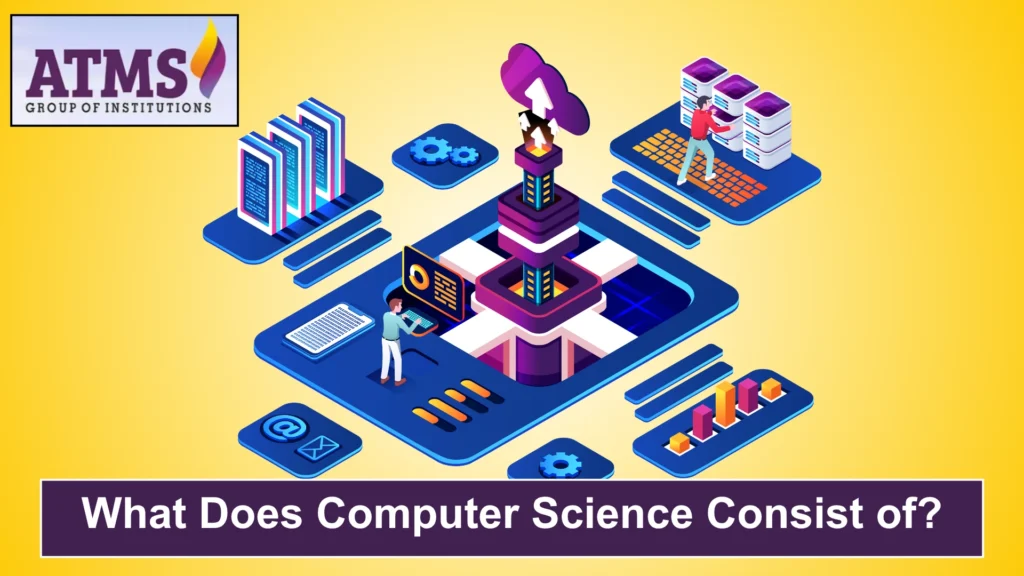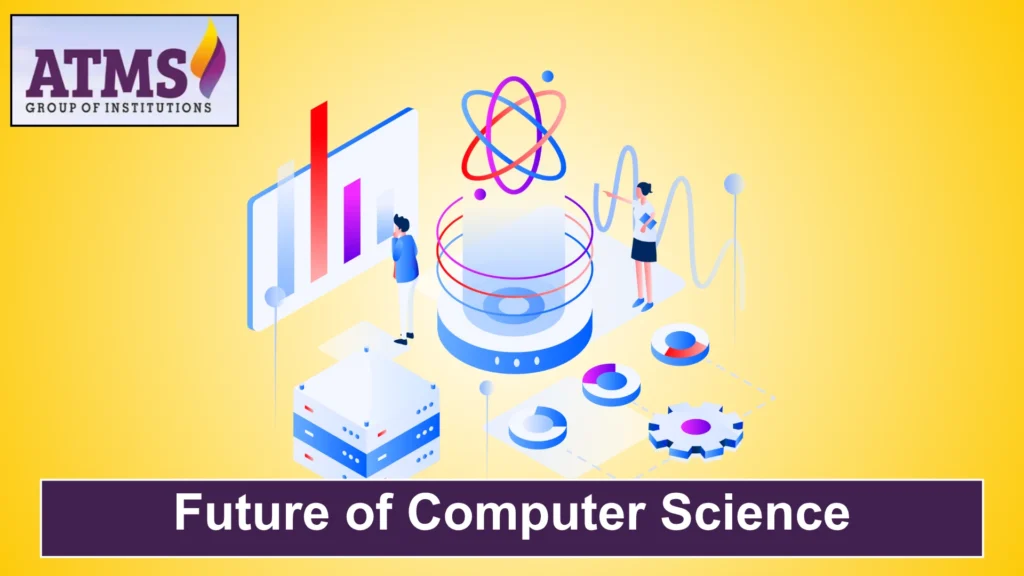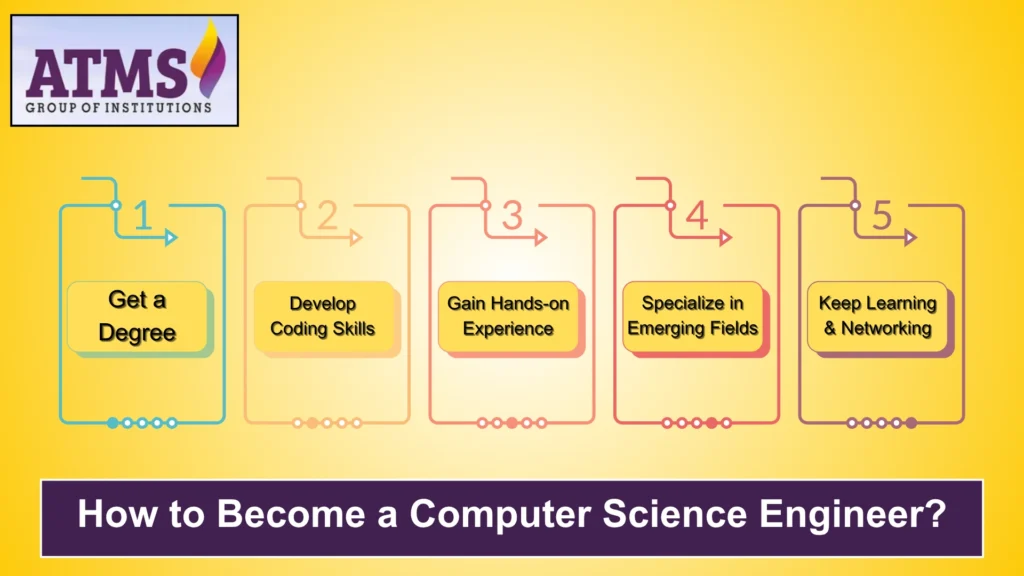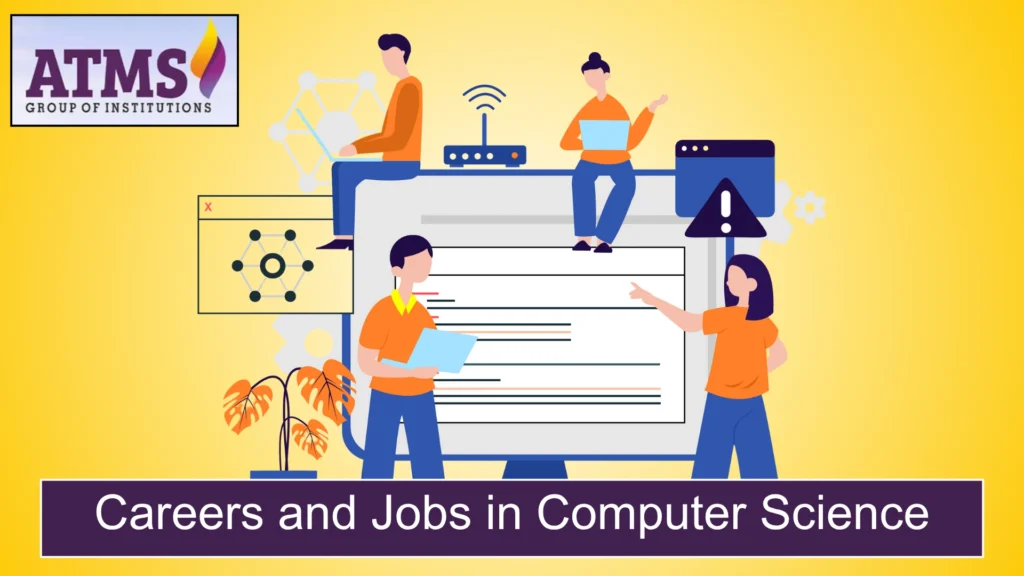Did you know that computer science is used in everything from the apps we use to order food to the algorithms that help doctors figure out if someone has disease?
This guide is for you whether you’re a student looking to get a job in tech, someone who’s interested in the field, or someone who’s trying to get a job in the growing IT sector. We’ll talk about what computer science is, its main parts, how it’s used in the real world, what’s coming up in the future, and job opportunities in this blog post.
What Is Computer Science?

What is computer science? It’s the study of computers, how they work, and how they can be used to fix problems. It teaches you about algorithms, hardware, and software.
The important thing is to turn your thoughts into steps that computers can follow. Modern technology, like the apps on your phone, Netflix’s recommendation tool, and the systems that keep the planes safe, is based on computer science.
What it does is worse than ever in 2026. Computer science is what makes AI possible, moves technology forward, and solves big problems in areas like healthcare, banking, and the environment. Now it’s not just about code; it’s also about making the world a better place by coming up with new ideas. To get into this exciting area, getting a degree in computer science is the best thing you can do.

What Does Computer Science Consist Of?
At its core, computer science is built on several key pillars:
- Algorithms are the step-by-step ways that computers and other machines solve problems, like when you search for something on Google or look up the weather. AI works because of these mathematical formulas and structures that are based on logic. They automate tasks and make a lot of other things work better.
- Digital managers called data structures help you store and organize data, like databases and the cloud. Computers work because of data structures, which can be as simple as arrays or as complicated as graphs. They make it easy to read, get, and change data quickly.
- Making apps, operating systems, and tools that use AI is what software development is all about. This field includes programming, UI/UX design, debugging, and software engineering. They let you make everything from business apps to social media sites.
- Hardware and systems, like processors and circuits, are the real parts of software that make it work. This includes computer design, embedded systems, networking, and operating systems that make sure that hardware and software work together without any problems.
- Cybersecurity is the act of protecting computer systems and networks from threats that come from the internet. There are more data breaches and hacks than ever before, so there is a high demand for cybersecurity experts to keep people safe online.
- AI and machine learning are the fields that look into how computers can learn from data, find patterns, and make decisions without much help from people. AI and ML are leading the way in new ideas in healthcare, banking, and automation.
- HCI, or Human-Computer Interaction, is the study of how people use computers and how to design systems that are simple for people to use. This field makes sure that technology is useful, easy to find, and available.
- Cloud computing and distributed systems are the names of the technologies that let you get to data and programs over the internet. Cloud computing services can help businesses grow quickly.
These building blocks change all the time. Algorithms shape AI ethics, data structures protect cloud infrastructure, and software is the first line of defense against hacking threats. To learn computer science, you need to know these things first.

Applications of Computer Science
Computer science is everywhere—powering industries and transforming daily life. Some key applications include:
- AI, or artificial intelligence, helps doctors figure out what’s wrong with people, makes shopping more fun, and does a lot of other things automatically.
- Computer science is the basis for blockchain technologies, digital payments, stock trading, and finding fraud.
- Healthcare: Algorithms can find signs of cancer in medical scans, and AI-powered diagnostics and telemedicine tools make it easier to care for patients.
- Transportation: AI-powered traffic control systems, self-driving cars, and real-time navigation systems are all changing how people get around.
- AI-powered recommendation engines, supply chain optimization, and research into how customers act all improve shopping in both online and brick-and-mortar stores.
- Cybersecurity and digital forensics are the fields that look at digital evidence to stop cybercrime, find cyber threats, and keep networks safe.
- Robotics and automation: Automation is changing a lot of things, like industrial robots and AI-powered home assistants.
- Biotechnology and bioinformatics are the fields that use computers to look at biological data, make progress in genetics, and find new ways to treat diseases.
With demand for tech skills rising, a degree in Computer Science equips students with the tools to start a career in these fields.

The Future of Computer Science
Where does field of computer science is being headed? The future could hold a lot of different things, and technology is getting better faster than ever. Here are some ways that computer science will change in the future:
- Quantum computing uses quantum physics to get a lot of computing power. This technology could help individuals working in areas like material science, cryptography, and drug discovery. Quantum computing address very hard problems very quickly.
- Advanced AI and Machine Learning: AI models are becoming more creative and able to solve problems like people do. This is testing the limits of automation, deep learning, and moral AI problems.
- AI is making smart cities more sustainable and connected by improving infrastructure, public safety, energy use, and traffic flow.
- Climate Tech: Advanced computer programs and algorithms are being used to make the best use of energy from renewable sources, forecast changes in the climate, and lower the damage to the environment using environmentally friendly technologies.
- Brain-computer interfaces (BCIs) that connect to your brain It could change how we use devices, medical research, and even assistive technology if computers and brains could talk to each other directly.
- AI-Powered Healthcare: More and more, the future of medicine will be automated and based on data. For example, there will be virtual health assistants, AI-driven diagnostics, and robotic surgeries.
In the next ten years, computer science could make huge advances that change whole industries. This would show that computer science is more than just writing code; it’s also about finding solutions to problems in the world and giving people new chances.

How to Become a Computer Science Engineer?
Do you aspire to work as a computer engineer? Here are the things you need to do:
- Get a level: It is very important to know a lot about both hardware and software, especially computer programming, algorithm development, and system design, which are all very important topics.
- Learn how to write code: You can learn how to code in languages such as Python, Java, C++, JavaScript, C. Learn the programming language and you’re interested in by working on real-world projects and practicing a lot.
- Get Practical Experience: To get practical expertise, work on real-world projects, help contribute to open-source communities, and search for internships.
- Learn new things: To get a better job, acquire knowledge about artificial intelligence (AI), cybersecurity, cloud computing, blockchain, and full-stack development.
- Keep up with tech trends: Participate in development communities, and work toward certifications. Also, continue learning new technologies.
If you keep going this way, you’ll soon be an outstanding computer science professional.

Careers and Jobs in Computer Science
People often ask, “What can you do with a computer science degree?” There are a lot of them! Computer scientists write code, look at data, build AI models, and keep networks safe. You could be writing code for apps, improving the performance of systems, working on security solutions, or learning about new technologies like quantum computing.
There are a lot of roles that could be played, like:
- Software Engineer: As a Software Engineer you will develop design software for everything from computer to phones or any device that uses software to work. You will write code, test it, and manage software as part of this job to make sure that users have a good experience.
- Data scientists: Data scientists analyze extensive datasets to identify valuable patterns and inform decision-making. Data scientists use computers, statistics, and machine learning to figure out what trends and patterns mean.
- Cybersecurity expert: Your job as a cybersecurity expert is to protect systems and networks from online threats and holes. They put security measures in place, watch for breaches, and make plans to protect digital goods.
- Game developer: making fun video games, from small indie games to big AAA games. Game designers use graphics, AI, and changing stories to make games that are fun to play.
- Blockchain developer: As a blockchain developer, you’ll make sure that decentralized apps and digital transfers are safe. They come up with and put into action blockchain-based solutions for banking services and keeping data safe.
- AI Engineer: Creating AI-driven machine learning models and solutions. AI experts teach models, improve algorithms, and use AI in the real world.
- DevOps engineer: Your job as a DevOps engineer is to make the processes for deploying software and running systems more efficient. DevOps professionals make sure that software delivery goes smoothly by automating tasks and making it easier for people to work together.
- IT consultant: As an IT consultant, you help companies improve their infrastructure and find tech solutions. They ask the client what they want and then suggest ways to make IT safer and work better.
Businesses are quickly adopting cloud computing, AI, cybersecurity, and automation, which is creating jobs that people want. The tech industry is always growing, so pay is good and there are jobs all over the world.
If you know how to use computers, you can work for a big company, a startup that’s growing quickly, or even start your own tech business.
here are so many fun and interesting choices. This job will always be in demand and pay well because there is a growing need for skilled workers.
ATMS Institute: How We Help You Succeed in Computer Science
With a project-based method, small group mentoring, and structured career support, ATMS Institute (Hapur) approved by All India Council for Technical Education (AICTE) turns Computer Science theory into skills that can be used right away on the job market.
You will build a strong foundation in DSA, DBMS, OS, and Networks whether you choose B.Tech. CSE, which is more focused on engineering, or BCA, which is more focused on applications. You will also get hands-on training in web development, cloud basics, AI/ML basics, cybersecurity basics, and DevOps practices.
You will turn in projects, show your work, and improve your portfolio every semester so that you can graduate with confidence instead of guesswork. With our coding clubs, hackathons, job programs, and help with interviews, it’s easy to see how to get from school to work.
What You’ll Learn and Build
- Core CS mastery: DSA, OOP, DBMS, OS, CN, Software Engineering.
- Modern stack exposure: Frontend + backend, REST APIs, databases, testing.
- Emerging tech basics: Cloud fundamentals, AI/ML intro, DevOps & CI/CD.
- Portfolio power: Mini projects each term.
- Git & teamwork: Version control, code reviews, issue tracking, agile habits.
How We Teach
- Hands-on labs: Practical sessions mapped to real use cases, not just theory.
- Mentor support: Faculty guidance + senior buddy system for doubt clearing.
- Clubs & hackathons: Weekly problem solving, build sprints, and internal hack days.
- Learning resources: Roadmaps, templates, and checklists for faster progress.
- Feedback loops: Regular demos, rubric based evaluations, and improvement plans.
Career Readiness & Placements
- Interview prep track: Aptitude, DSA patterns, system design basics, mock HR/tech.
- Resume & LinkedIn polish: GitHub clean-ups, project storytelling, STAR answers.
- Internships & live projects: Local/regional partner tie-ups and referrals.
- Industry connects: Expert talks, alumni sessions, and portfolio showcases.
- Soft skills built-in: Communication, presentations, teamwork, time management.
Conclusion
That’s all there is to know about computer science. It is the study of computers and how they work, using algorithms and data structures. It makes people think of new things in areas like business, healthcare, and entertainment. It is speeding up the growth of fields like AI, quantum computing, and automation, which is changing the digital future faster than ever before.
There’s no question that people are very interested in this field. If you want to start a job, make cutting-edge apps, or just learn more about the digital world, computer science is the key to all of these things.
Are you ready to get started? The first thing you need is a degree in computer science. You can learn how to code, see how it works, or sign up for a free lesson. The future is now, and technology is always changing. Are you ready to join?

